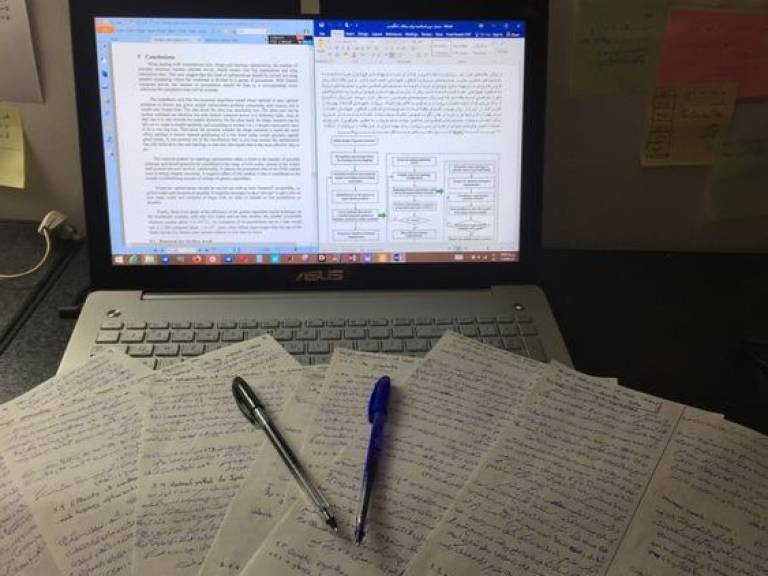Student Voices: Exam Season Q&A with Mona, BSc Population Health Sciences
4 May 2023
BSc Population Health Sciences student, Mona, tells us about exam season at UCL and how it compares to her high school experience.

Exams at university vs high school
Tell us about your high school qualifications.
I have completed the French Baccalaureate at high school. I found it quite challenging preparing for this as I had to study for a range of different subjects all at the same time : French, English, Chinese, Philosophy, History, Geography, Physics, Biology, Economics, further Biology, and further Math. As I had many subjects to tackle all at once, I found it difficult in terms of where/how to put my energy and focus into certain topics.
How is revision different at university level?
At university, education is much more specific. I am now choosing what I am learning which makes learning on a whole more fun. However, other stress factors such as outside commitments and everyday chores is something that does take some time and may give you some extra stress.
Revision styles
How does your revision differ from preparing for essay-based exams to more factual exams?
When preparing for an essay exam, the emphasis is typically on gaining a thorough comprehension of the subject matter and being able to thoughtfully analyse and interpret it. It might be good to concentrate on reading and understanding a text's core concepts, taking thorough notes, and synthesising knowledge from several sources as you prepare for this kind of exam. On the other hand, factual exams emphasis is frequently on memorisation and recall of specific data. It might be better to concentrate on making flashcards, practising knowledge recall from memory, and identifying key terms and concepts that you will need to be familiar with while you study for this kind of exam.
What is an essential part of your revision?
To study for exams I do like working ahead to give myself as much time as possible to revise for exams. My revision part consists of two parts (1) going over the notes : going through the information, doing a bit more research on the topics if needed (2) doing past papers : this enables me to be in exam conditions
What is your typical revision day routine?
- I wake up at 8:30, I make myself some breakfast which consists of oats and cut apples with a big spoon of peanut butter (99% of the time!).

- I then go through the notes I took of the class I have that day while I have my breakfast. Around 9:40 I make my way to campus.
- 10-1pm I have my lectures/seminars
- 1-2pm I’ll have lunch around campus with a friend
- 2-4pm I’ll go get some work done at a library or a cafe. I go through readings, lecture slides, and practicals that are required.
- 5pm onwards I’ll go to my spin class
- 7pm onwards - this usually depends on the day but sometimes if my workload is heavy I’ll get more work done or I’ll go out if not! (it’s all about balance)
What do you do to look after your wellbeing during exam season?
Firstly acknowledge that exams can be stressful time of year. It is sometimes difficult to tackle a lot of stress during exam period. Being far from home may aggregate that feeling of ‘you are in this alone’. What makes me feel a bit more confident is knowing that every student is going through the same thing as you. If you have questions, speak up. It’s always nice to reach out to a friend and study for exams together, it will feel a lot more comforting! I personally am someone who needs to clear up my mind after a stressful day. The best way for me to do so is getting some fresh air and getting my body moving. I usually go to spin classes twice a week which helps me maintain that work-health balance.
Support at UCL
What support does UCL offer?
UCL offers a wide range of support for exams. Firstly, they offer many different work spaces : UCL coffee shops, work rooms, group work rooms, libraries, etc. You can definitely find a place in terms of what type of environment you want to work in. I really have enjoyed exploring the different spaces they offer! Further, the university is very mindful of their students. They know and have the tools to offer during exam season. This consists of extenuating circumstances if something is disrupting your revision period (illness, or personal reasons), past papers, and open hours. Something worth mentioning is that there is mental health support as well at university. UCL offers a space for wellbeing support and this can come to use if needed when feeling overwhelmed during exam period.
What advice would you share to future students?
It's crucial to keep in mind that tests are only one aspect of your education and neither your value nor intelligence are determined by them. Your future is not necessarily predetermined by your grades. Exams may seem like it’s your entire life right now, but trust me, you will be okay, you will figure things out no matter what. Despite this, it's still crucial to put in your best effort and spend as much time preparing as you can for your tests. Establish and follow a study routine, go over your notes frequently, and, if necessary, contact your teachers or fellow students for assistance. To acquire a taste of the exam questions and to determine any areas where you need to improve, practise old papers!
 Close
Close

